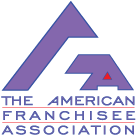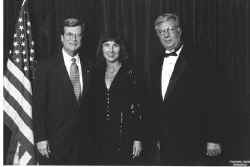|
|
|
|
September 1998 Blast Fax
|
- Political Action Group (PAC) -Appeals Court Reverses Meineke Decision -A Success Clearing the Air Program Book Available |
November 3 is Closer Than You Think
| The 1998 elections are almost upon us. If
you’re like most franchisees, between running your business and making time for your
family, you probably don’t have much time to devote to understanding candidates and
politics. You are, however, aware of the enormous impact political candidates can have on
your business. That’s where a Political Action Committee (PAC) comes in. A PAC is a convenient and effective tool where people with similar interests voluntarily pool their money to fund the candidates that support their interests. |
|
There are thousands of PACs. There are hundreds of small business PACs. But there is only one PAC devoted solely to the interests of franchisees—the AFA PAC. Through AFA’s PAC you get the opportunity to support candidates who understand small business franchisees and who are supportive of our position on franchise relationship issues.
It takes time to change the viewpoints in Congress. AFA has been investing that time. But to continue our work we need access to the lawmakers. Access is neither shady nor illegal. You can’t buy a vote in Congress. But you can get an opportunity to state your case by effectively utilizing PAC contributions.
PACs hold politicians accountable. If they support franchisees and our position on franchise relationship issues, we’ll support them in their campaigns. If they continue to go against our long-term interests, their opponents will get our contributions. AFA’s PAC is the only means we have of letting politicians know that there is some benefit to being the franchisee’s friend.
Money contributed through AFA’s PAC has almost double the impact of money contributed individually to a candidate’s campaign. It costs more to raise money from an individual than from a PAC. When candidates accept PAC contributions they don’t have to solicit you and your neighbor. All the candidate has to do is prove he or she meets the PAC’s criteria. That makes the candidate’s job a lot easier.
It makes our job easier, too, because money contributed from AFA’s PAC gives the candidate a very clear idea as to what issues the people supporting the PAC are most interested. A contribution from AFA’s PAC sends an issue message attached to financial support. That message is simple—we want you to vote in the interests of franchisees.
AFA’s PAC does not get involved in social issues. AFA’s PAC exists solely for one reason--to represent franchisees’ interests to Congress and the state legislatures.
Take the time to fill out the form and return it with your personal check made out to AFA’s PAC. (PAC contributions are accepted from personal funds only. PAC contributions from a business or corporate account will be returned as is required by federal law.)
Legal Brief
Appeals Court Reverses Meineke Decision
The U.S. Court of Appeals for the Fourth Circuit reversed the $390 million verdict in favor of the franchisees in Broussard v. Meineke Discount Muffler Shops, Inc. and returned the case to the district court for further proceedings.
In an earlier decision, the district court had held that the case could proceed as a class action, with the named plaintiffs representing current and former Meineke franchisees nationwide. After a jury trial, the district court entered judgment in favor of the class for $390 million against Meineke and other parties. The judgement was based on a variety of contract claims relating to Meineke’s administration of the franchisee advertising fund as well as statutory unfair trade practice claims and various tort claims, including breach of fiduciary duty.
In reversing the district court’s decision, the court held that the district court should not have approved the class action. The court noted that there was a conflict of interest between the different groups of franchisees as to the relief sought, since the former franchisees’ goal was to maximize the amount of any damages Meineke would have to pay while the current franchisees who had released Meineke and had joined the Enhanced Dealer Program were concerned that a large damage award would hurt the company and in turn those franchisees as well. In addition, the court held that the requirements that the plaintiffs’ claims have something in common with and be typical of the other class members’ claims were not met, since the named plaintiffs could not prosecute their breach of contract claims on behalf of the entire class when there were varying forms of franchise agreements and because the proof required for the claims for lost profits as well as the tort claims differed as to particular franchisees.
The court also held that the district court “misconceived the basic character of the lawsuit” and erred in permitting the plaintiffs to pursue their claims for breach of fiduciary duty and other torts and for unfair trade practices. With respect to the breach of fiduciary duty claim, the court held that there is no indication that North Carolina law would recognize the existence of such a duty in the franchise context and noted that courts in other jurisdictions have likewise refused to impose a fiduciary duty upon a franchisor. The court also noted that under North Carolina law, parties to a contract do not owe each other any duties outside of that contract. This point was strengthened by the fact that the franchise agreements contained integration clauses, which stated that they represented the entire agreement between Meineke and the franchisees and that no representations or other agreements existed. Finally, the court stated that it was not necessary to impose a fiduciary duty on a franchisor such as Meineke because franchisees are protected by the federal disclosure regulations, by their remedies for breach of contract and by the market itself, where franchisors earn reputations because of franchisees’ communications with each other.
LEGAL BRIEF was prepared by AFA Affiliate Member Michael Einbinder.
AFA
Legal Symposium
A Success Clearing the Air Program Book Available
The AFA held its first Franchisee Legal Symposium, sub-titled Clearing the Air, in Lake Tahoe this past April. According to attendees it was a huge success. This is what some of them had to say:
“The agenda and subjects covered were outstanding;” “You hit on the main points that I came to hear about. Well organized, informative, excellent instructors, great manual;” “The planning that allowed you to provide a reference book that matched the presentations...wonderful idea;” “This was like a crash course from Harvard Business School...very informative;” “I liked the opportunity to hear from experts on franchise law. The franchisee attorneys were stupendous;” “Well organized, to the point, open to both the positive and negative, the program book is great.”
The Clearing the Air Program Book of written materials from the 1998 AFA Franchisee Legal Symposium is now available for purchase. The price for both AFA members and non-members is $175 (includes shipping & handling). To order, call the AFA at 312-431-0545.
In Memory of Our
Friend—Paul Rabin
April 29, 1941 - March 24, 1998
It is with great sadness that we report the passing of Paul Rabin. You probably met Paul at an AFA convention in Las Vegas as far back as 1994 or at one of the many Legislative Affairs Days (LAD) in Washington, DC that he took the time to attend.
Paul was a franchisee, a lawyer and a passionate advocate of franchisees’ legal rights. He represented the SUPERCUTS franchisees on the AFA Board of Directors and was a delegate to the 1995 White House Conference on Small Business from the state of California. Paul died of pancreatic cancer six months after his diagnosis.
Paul’s wife, Jeannette, asks that donations in memory of her husband be sent to the hospice which took such good care of him. The name and address of the hospice is: Mid Peninsula Hospice Foundation, 65 El Camino Real, Menlo Park, CA, 94025. Please indicate that your donation is given in the memory of Paul Rabin. If you would like to communicate with Paul’s wife, please write to Jeannette Rabin at 204 Vaquero Way, Redwood City, California 94062.
|
|

